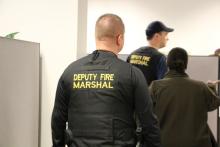The Fire Marshal's Office
Fire Marshal's Office

The Fire Marshal's Office is responsible for three main areas of fire prevention: code enforcement, fire and explosive investigations, and hazardous materials and environmental investigations. Fire prevention inspections are conducted routinely, and staff responds to complaints and violations of the Statewide Fire Prevention Code, such as overcrowding, unlawful occupancy use, improper storage or disposal of hazardous materials, unlawful use or storage of fireworks, and inoperable fire protection systems.
Fire Marshals (investigators) assigned to conduct investigation into the cause and origin of fire, explosions, and unlawful release of hazardous materials has the same powers as law enforcement officers in the Commonwealth of Virginia and have undergone extensive training in fire and explosive investigations, forensic science, evidence collection, hazardous material, applicable environmental regulations, and other area of law enforcement training. Fire Marshals and Fire Inspectors are certified and are authorized to enforce the provisions of the Statewide Fire Prevention Code and applicable sections of the Code of Virginia and City of Alexandria Code.
Fire Prevention Inspections
The Fire Marshal’s Office enforce the provisions of the Virginia Statewide Fire Prevention Code as adopted and amended by the City of Alexandria. Staff routinely inspect and respond to complaints in existing properties to ensure code compliance for the protection of life and property from the hazards of fire and explosion. In addition, opportunity is provided to educate business owners and occupants on fire safety and how best to institute best practices to achieve code compliance. The Fire Marshal’s Office inspect all commercial properties and any occupancy that requires operational permits for use such as places of assembly, educational facilities, hospitals, nursing homes, commercial day care facilities, and occupancies that store, use or manufacture hazardous materials.
Fire and Explosion Investigations
The Fire Marshal's Office investigates fire and explosive incidents to determine the origin and cause of the event. The data and evidence collected during an investigation is of great significance because it can determine how a fire or explosion occurred and if any fire related laws, such as arson, was violated and to provide valuable statistics on fire trends and information essential in developing programs to reduce fire and explosion risk in the future.
In addition, any fire-related death, burn injuries, suspected explosive devices, and any threat to bomb or burn in violation of fire related laws are investigated.
Hazardous Materials and Environmental Investigations
Fire marshals investigate the unlawful release of hazardous materials, spills, and conducts fire code inspections of facilities using and storing hazardous materials. Fire marshals investigate environmental related offences such as instances of illegal dumping of hazardous waste, tires and other related materials and coordinates information with other City agencies about hazardous and industrial-related uses within the City of Alexandria.
WHAT ARE HAZARDOUS MATERIALS?
Hazardous materials are substances or materials, in any form or quantity, which pose unreasonable risk to safety, health or property when released from their container. Some hazardous materials are more common than others and many can be found within household environments. Many of these products are used daily without any incident but can cause problems if not properly handled or disposed.
Examples of common hazardous materials include:
- Fuel and other petroleum products (gasoline, diesel fuel, transmission fluid, motor oil, brake fluid, kerosene)
- Propane
- Butane, ethanol, methane (natural gas)
- Explosives
- Solvents, paint thinners and strippers, varnish
- Strong cleaning agents (drain cleaners, metal cleaners, brush, and paint cleaning agents)
PROPER DISPOSAL OF HAZARDOUS MATERIALS
Note - It is unlawful to release any hazardous substance or chemical into any storm drain or sewer within the City of Alexandria, including automotive fluids (oil, antifreeze, brake fluid, gasoline or other motor fuels); paint, paint thinner, varnish, solvents and any hazardous cleaning chemicals.
- Many hazardous materials can be recycled through the City of Alexandria Household Hazardous Waste & Electronics Collection Center. Visit the webpage for a list of acceptable and unacceptable items and the center's regular hours of operations.
Permits
FIRE PREVENTION PERMIT (FPP) PROGRAM
Certain occupancies may be required to obtain a fire prevention permit based on their use or storage of regulated materials. Fire prevention permits are required by Virginia Statewide Fire Prevention Code as amended by the City of Alexandria. Annual inspections are conducted in properties that store or use hazardous materials or conduct hazardous processes such as welding, auto repair and processes involving the use of flammable or combustible liquids and gases. Additionally, the program includes annual inspections of all assembly and educational occupancies within the City to include restaurants, schools, churches, hotels and day care facilities. Permits are issued annually as part of the inspection process. Fire prevention permits are also issued for certain temporary or special events.
Fire Prevention Permit Fees (effective as of July 1, 2018)
Examples of businesses or use of materials that typically require a Fire Prevention Permit:
- Places of assembly and educational use (restaurants, nightclubs, churches, theaters)
- Service Station, Repair Garage, Auto Body Shops
- Flammable and combustible liquids storage and use
- Fuel dispensing
- Food trucks and mobile food vendors
- Cutting and welding, hot work, use or torch or open flame device
- Propane storage and use
- Compressed gases
- Explosives
- Corrosive materials
- Aerosols
- Toxic materials
Special Event Requirements
If you are planning a special event or are an event coordinator, please take the time to read this policy. The policy gives guidelines and requirements for items such as tents, open flame and propane cooking devices, carnivals and fairs, outdoor assembly events, amusement devices and other issues associated with many typical events, as well as some general fire safety requirements.